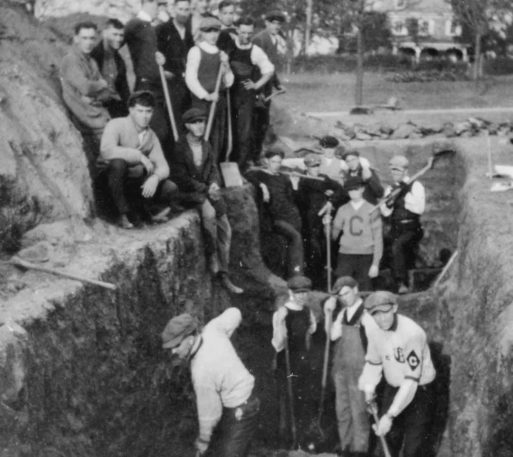
Mass deaths from the Spanish Flu led to the creation of mass graves in the U.S.
Credit: Catholic Historical Research Center of the Archdiocese of Philadelphia
More than 700,000 Americans have died from COVID-19 since the beginning of the pandemic, placing massive strain on funeral directors – particularly in states hit hard by the virus. Yet COVID-19 is only the latest of several mass death events that have circled the globe in recent centuries. How have best practices changed in response to mass death events, and how might they evolve going forward?
New York was overwhelmed by mass death early on in the pandemic. Mike Lanotte, who heads the New York State Funeral Directors Association, told Fortune that while the state’s funeral homes, crematoria and cemeteries were used to handling around 400 deaths per day, a huge spike left them unable to keep up; at one point, bodies were stored in refrigerated trucks. “It probably lasted through the early part of summer 2020 before it really started to come down to a point where the system could really catch up,” he said.
As the pandemic wore on, officials developed best practices to grapple with mass death. In addition to refrigerated trucks, these included using crematoria in nearby jurisdictions, waiving rules governing pathologists, or the creation of short-term morgues. One California air quality agency temporarily lifted the limits imposed on cremations. Many of these approaches were more sophisticated than those employed during mass death events of the past, such as mass graves during the Black Plague or emergency plot-digging during the Spanish flu. Others were eerily similar – New York relied heavily on a mass grave on Hart Island, while outside the States, Ecuador rushed to build emergency cemeteries.

Limited numbers of mourners were permitted at funeral services.
Credit: Pavel Danilyuk
Some industry experts say that funerary services have been forever changed by COVID-19. Funeral homes took a financial hit as services were canceled, even as industry burnout rose. Meanwhile, morticians lost their lives, particularly in Black communities, leaving holes in the industry. Some experts believe that funeral providers will see greater consolidation or increasingly rely on technologically enhanced approaches.
It remains to be seen how these adaptations will affect the funeral industry’s response if – or when – another mass death event occurs.

 Funeral Directors Grapple with Mass Death – Again
Funeral Directors Grapple with Mass Death – Again


 “Help Me, Helen”
“Help Me, Helen”

 “As Tears Go By” by Marianne Faithfull
“As Tears Go By” by Marianne Faithfull














